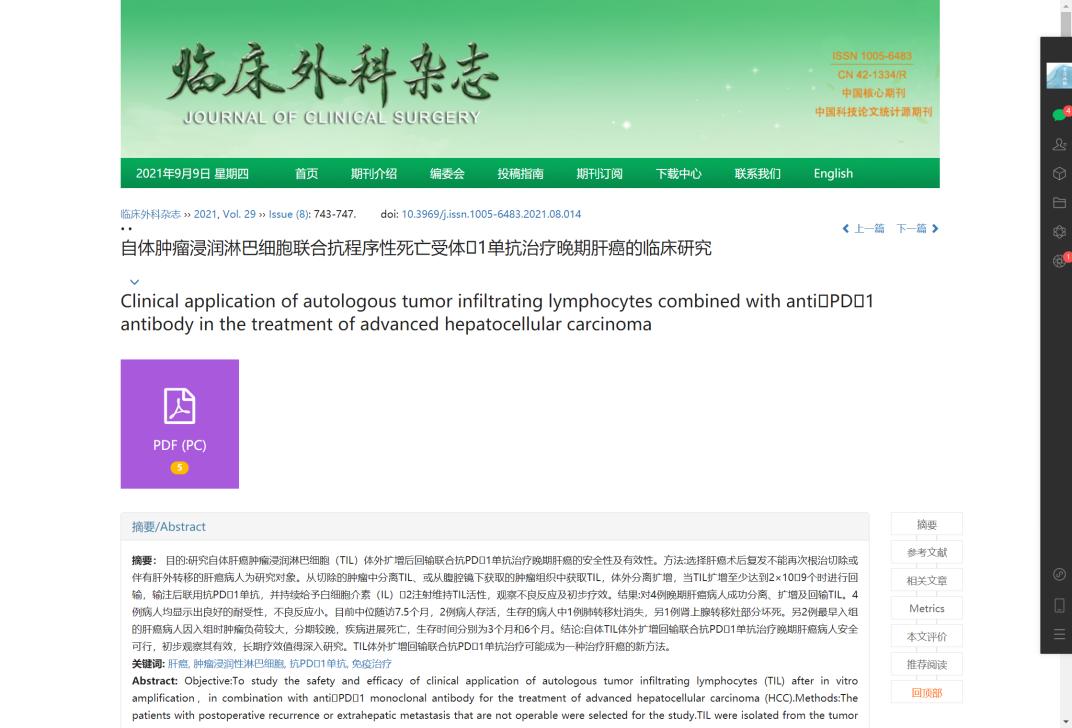The clinical trial results of HUST’s autologous tumor infiltrating lymphocytes (TIL) therapy technology in advanced liver cancer were recently published online in the Journal of Clinical Surgery of the Chinese Medical Association, which was the first report of the clinical trial study in the world.
Based on the research conducted by Huang Zhiyong’s team from the Department of Hepatobiliary Surgery, Tongji Hospital, Tongji Medical College, Huazhong University of Science and Technology, and the Xia Tian’s team of the School of Artificial Intelligence and Automation, the team developed a new TIL technology featuring “All in Chip”, which was the innovation of traditional TIL therapy technology based on artificial intelligence and information engineering technology. By using the new TIL technology, the tumor-specific lymphocytes can be accurately screened and efficiently amplified in vitro, and then infused into the patient’s body. In this way, the new technology has been proved safe and effective.

This study designed a detailed experimental method to observe the safety and effectiveness of this approach mentioned above. First, TIL was separated from the excised tumor, then it would be separated, screened, and amplified in vitro. The TIL would be infused into the patient’s body as soon as the number of TIL reached the clinical therapeutic level, and then the anti-PD-1 monoclonal antibody was used for continuous treatment. In the current four clinical trials, 3 cases of advanced hepatocellular carcinoma and 1 case of intrahepatic cholangiocarcinoma were successful in expanding the TIL in vitro and infusing them into the patient’s body, and the maximum expansion of TIL reached 3.5*10-10 cells. Among the 4 patients, only 1 patient had grade I adverse reactions, and none of the 4 patients had serious adverse events of grade III/IV before and after cell injection. Among them, 1 patient with bilateral adrenal metastasis after liver cancer surgery was treated with TIL reinfusion combined with PD-1 monoclonal antibody for 12 weeks and was found that the patient reached a partial response (PR), with the right adrenal metastasis partially necrotic, and the number of alpha-fetoprotein decreased significantly. In another case of liver cancer with scattered metastases in both lungs, the primary tumor was removed and TIL was extracted. After 11 weeks of TIL reinfusion therapy combined with PD-1 monoclonal antibody treatment, it was found that the patient reached complete response (CR) with the metastases in both lungs disappearing. (The treatment response is based on WHO standards and/or Response Evaluation Criteria in Solid Tumors (RECIST)).
At present, the two patients with advanced liver cancer have been followed up for more than one year, and experts will continue to observe the efficacy of the combined therapy. This is the first time at home and abroad to use immune node inhibitors combined with adoptive immunotherapy which has been observed significant effects on advanced liver cancer.
The study is an exploration of combined immunotherapy, and the therapeutic effect has been verified in clinical trials. In other words, it is safe and feasible to treat patients with advanced liver cancer by reinfusion of TIL after expanding them in vitro combined with anti-PD-1 monoclonal antibody. This combined therapy is promising to become a new method for the treatment of liver cancer.
Edited by: Chen Kexuan
